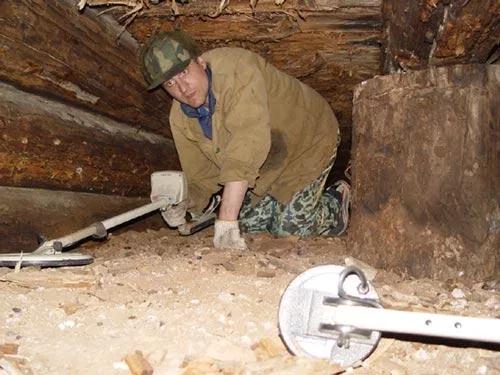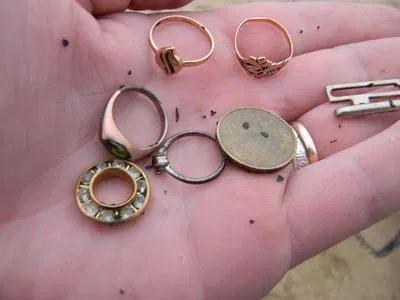best reviews metal detectors for gold
Interesting information about treasure hunters
Searching with metal detector in residential villages is somewhat different from looking for spaces. Here are the highlights of this type of research:.
1. Availability of seats
To even reach sexist villages and villages in most cases can be a normal car on relatively normal roads. or even on public transport.
2. A wide range of discoveries
In the existing villages you can find all of the coins from the time of the appearance of this village, and modern. The same applies to the age of other finds: horse, crosses.
3. Large amount of garbage
Particularly annoying, which on many metal detectors loop like coins. You can’t even talk about the signals “black”: as far as the pros in swing one of the coils - something common in such places.
4. Great depth of ancient discoveries
Old coins, crosses, horse and other objects, which are over 50 years of age, will not be on the surface. With some exceptions, of course. That is, these same discoveries, but in the village, emptied half a century ago, will be on average closer to the surface. In addition, the old goals may fall under the latest, making the search more difficult.
5.The grass is high in some areas
In residential settlements you can often find areas with low grass, which do not interfere with research with metal detector. All thanks to the grazing animals there: horses, cows and sheep, who eat this grass. This can also include unused or unused dirt roads, which are overgrown with high grass not immediately. Accordingly, in residential settlements you can dig up in the summer, when all the tracts are overgrown with thick grass, and the plow is planted.
metal detecting and treasure hunting, metal detectors treasure hunting finds, metal detectors treasure hunting videos, treasures found with metal detectors, organized metal detecting hunts, metal detecting treasure, youtube treasure hunting metal detector, treasure hunting videos youtube, youtube treasure hunting with metal detectors, beach treasure hunting with metal detectors, treasure hunting with metal detectors videos, amateur treasure hunting with metal detectors.
6. Having electrolyte intervention
Power lines, cell towers, and various electrical equipment can make the search somewhat more difficult, creating interference with the device. There are two options: either avoid places with electrical interference, reduce the sensitivity of the device or activate the protection of jamming, if any.
7. Curiosity from the local population
Digging in a residential village get used to being the center of attention. Especially in those places where a person with a metal detector is quite rare. Locals can show both normal healthy curiosity, and not quite healthy, although the latter I personally did not come across.
If there are no more than a dozen or two houses in the village, you can not see a single person in a few hours of searching. If the settlement is bigger, then someone will probably come to you with questions like “Metallom digging?”, “And what depth takes?”, “What can you find?”, “And there is a treasure buried, not dug still there?” and the like.
At the same time, most people are very friendly, so do not avoid communication. Especially since they can learn a lot of interesting things, for example, whether there were other diggers. Or where were the oldest and richest houses? In general, act on the situation.
Search in the existing village or village has both its pros (accessibility, little grass), and cons (a lot of garbage, great depth). Because people live here it is necessary to be especially careful and prudent: of course to bury holes, not to dig in the immediate vicinity, and even more so on private territory without the permission of the owner, to be polite to others.
It is not uncommon for a group to be judged on a group as a whole. And treasure hunters are no exception. If before you there was a person with a metal detector, who, for example, left behind deep unburied pits or climbed without permission for private property, then the attitude to you by the local population will be biased.
what does discrimination mean on a metal detector
Very powerful yet simple home made metal detector DIY
Simple metal detector on two chips NE 555
Smartphone Homemade metal detector
Tesoro Tejon vs Garrett ACE 250 discrimination test
Very powerful yet simple home made metal detector DIY
Simple metal detector on two chips NE 555
Smartphone Homemade metal detector
Tesoro Tejon vs Garrett ACE 250 discrimination test
Video how to make a metal detector
Where to look for a metal detector
Where to look with a metal detector
Where to dig with a metal detector by law
Where to find a metal detector
Where to look for a metal detector
Where to find a metal detector
What a metal detector is for
How to choose a metal detector
How to choose a metal detector to search
How to look without a metal detector
How to look for a metal detector
What's the name of the metal detector
How to find gold metal detector
How to find metal detector
How to set up a metal detector
How to set up a metal detector
How to set up a garrett metal detector
How to set up a metal detector x terra 705
How to set up a metal detector garrett
How to set up a metal detector
How to check the metal detector
How to pass a metal detector
How the metal detector works
As a metal detector itself
How to make a metal detector at home
How to make a reel on a metal detector
How to make a metal detector pirate
How to make a metal detector with your hands at home
How to make a powerful metal detector
How to make a simple metal detector
How to make a homemade metal detector
How to assemble a metal detector pirate
Stores where metal detectors are sold
Metal detector for gold how to choose
Metal detector how to choose to search for gold
What to find a metal detector
What they find as a metal detector
What is a metal detector
Active hobbies
Bounty Hunter metal detectors
buy metal detector
Minelab metal detectors
coin collecting
compare metal detectors
Fisher metal detectors
Fishing skills
Garrett metal detectors
metal detector works
professional metal detectors
Search for metal detector
security metal detectors
Teknetics Metal Detectors
treasure hunting with metal detectors
Where to look for a metal detector
Where to look with a metal detector
Where to dig with a metal detector by law
Where to find a metal detector
Where to look for a metal detector
Where to find a metal detector
What a metal detector is for
How to choose a metal detector
How to choose a metal detector to search
How to look without a metal detector
How to look for a metal detector
What's the name of the metal detector
How to find gold metal detector
How to find metal detector
How to set up a metal detector
How to set up a metal detector
How to set up a garrett metal detector
How to set up a metal detector x terra 705
How to set up a metal detector garrett
How to set up a metal detector
How to check the metal detector
How to pass a metal detector
How the metal detector works
As a metal detector itself
How to make a metal detector at home
How to make a reel on a metal detector
How to make a metal detector pirate
How to make a metal detector with your hands at home
How to make a powerful metal detector
How to make a simple metal detector
How to make a homemade metal detector
How to assemble a metal detector pirate
Stores where metal detectors are sold
Metal detector for gold how to choose
Metal detector how to choose to search for gold
What to find a metal detector
What they find as a metal detector
What is a metal detector
Active hobbies
Bounty Hunter metal detectors
buy metal detector
Minelab metal detectors
coin collecting
compare metal detectors
Fisher metal detectors
Fishing skills
Garrett metal detectors
metal detector works
professional metal detectors
Search for metal detector
security metal detectors
Teknetics Metal Detectors
treasure hunting with metal detectors
Who hasn’t dreamed of finding the treasure? Even people who have never held a metal detector, at least once thought about how their lives would … […]
Not to say that more often than in other promising places, but not less often. With a few exceptions, of course. Once in his garden … […]
Comments & Responses
Leave a Reply
Your email address will not be published. Required fields are marked *
Comment
Leave a Reply
Your email address will not be published. Required fields are marked *
Comment
Name *
Email *
Website
What is a metal detector and how it works
How the metal detector works and more for beginners
What is a metal detector and how does it work?
How manual and arched metal detector works
Best metal detector for gold
What can be found with a metal detector?
What can be found with a ground metal detector
Options for balancing the ground of metal detectors
What benefits can be brought to treasure hunters of downpours
What can you find with a metal detector?
How to use a metal detector and what to find
What can i find with a metal detector?
Looking for a treasure without a metal detector
Finds that can be made with a metal detector
Is it possible to find a treasure in Estonia and what to do if something valuable has fallen into your hands?
Named places where in the suburbs with a high probability you can find a treasure
What and where can be found with a metal detector?
How the metal detector works and more for beginners
What is a metal detector and how does it work?
How manual and arched metal detector works
Best metal detector for gold
What can be found with a metal detector?
What can be found with a ground metal detector
Options for balancing the ground of metal detectors
What benefits can be brought to treasure hunters of downpours
What can you find with a metal detector?
How to use a metal detector and what to find
What can i find with a metal detector?
Looking for a treasure without a metal detector
Finds that can be made with a metal detector
Is it possible to find a treasure in Estonia and what to do if something valuable has fallen into your hands?
Named places where in the suburbs with a high probability you can find a treasure
What and where can be found with a metal detector?


